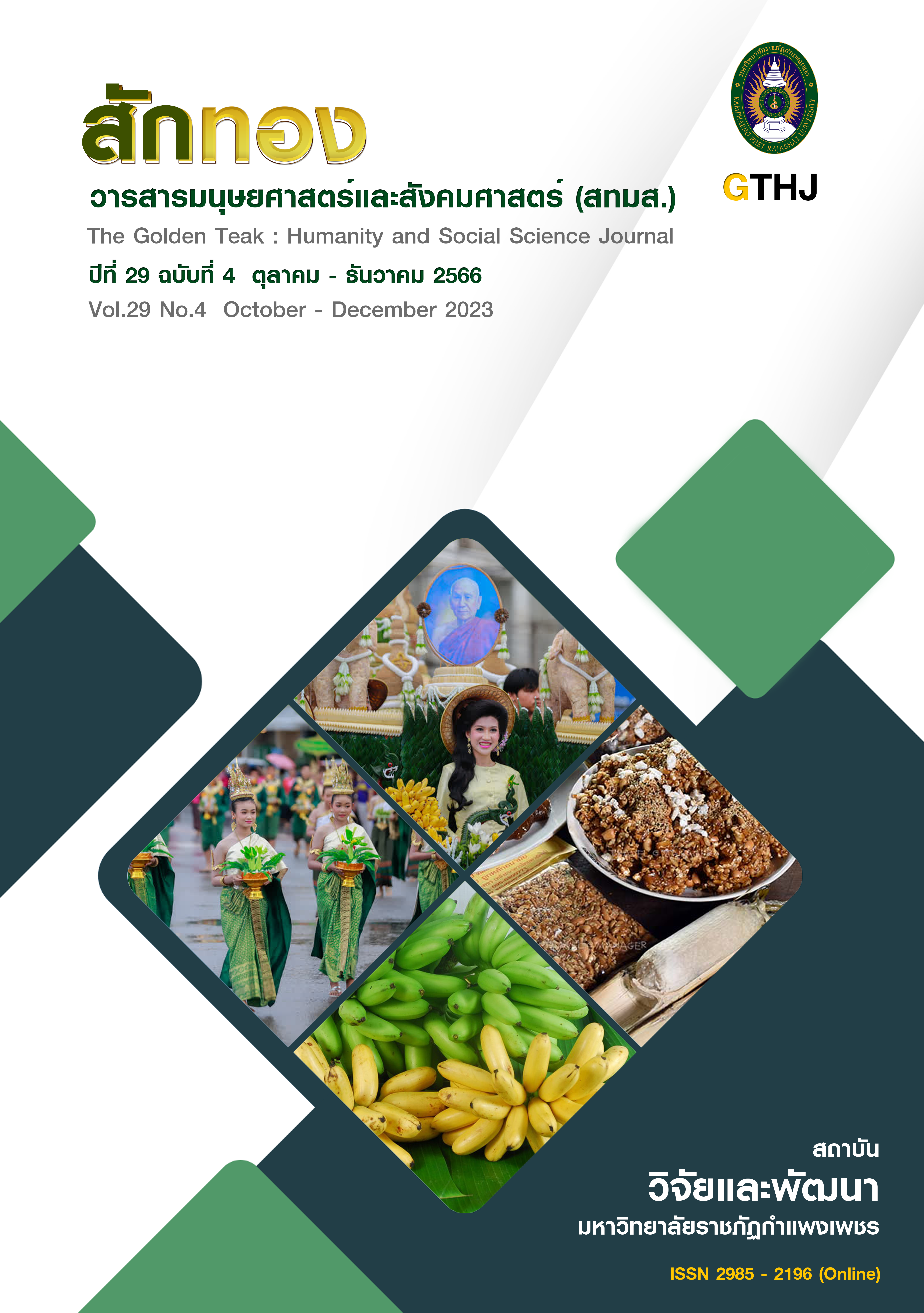การจัดการเรียนรู้เชิงประสบการณ์ร่วมกับการใช้งานทางคณิตศาสตร์เพื่อส่งเสริมทักษะ การเชื่อมโยงทางคณิตศาสตร์ เรื่อง ความคล้าย ของนักเรียนชั้นมัธยมศึกษาปีที่ 3
Main Article Content
บทคัดย่อ
การวิจัยนี้มีวัตถุประสงค์เพื่อ 1) ศึกษาแนวการจัดการเรียนรู้เชิงประสบการณ์ร่วมกับการใช้งานทางคณิตศาสตร์ และ 2) ศึกษาทักษะการเชื่อมโยงทางคณิตศาสตร์ เรื่อง ความคล้าย กลุ่มเป้าหมายของการวิจัยครั้งนี้คือนักเรียนระดับชั้นมัธยมศึกษาปีที่3 จำนวน 40 คน ระเบียบวิธีวิจัยใช้การวิจัยปฏิบัติการ 3 วงจร โดยใช้แนวคิดของKemmis & McTaggart (1998) เครื่องมือวิจัย ได้แก่ แผนการจัดการเรียนรู้ บันทึกสะท้อนผล แบบวัดทักษะ และใบกิจกรรม เก็บรวบรวมข้อมูลโดยการวัดทักษะ และการสังเกต การวิเคราะห์ข้อมูลใช้การวิเคราะห์เนื้อหาและการตรวจสอบแบบสามเส้า ด้านวิธีการรวบรวมข้อมูล นำเสนอผลการวิเคราะห์ข้อมูลโดยการบรรยายเชิงวิเคราะห์ ผลการวิจัยพบว่า 1) ครูเลือกใช้สถานการณ์ที่สัมพันธ์กับประสบการณ์ของนักเรียน เลือกใช้งานทางคณิตศาสตร์ที่หลากหลายมีการปฏิบัติการและการทบทวนความรู้ รวมทั้งใช้คำถามเพื่อตรวจสอบการเรียนรู้ของผู้เรียนอย่างต่อเนื่อง นอกจากนี้พบว่า 2) นักเรียนสามารถพัฒนาทักษะการเชื่อมโยงคณิตศาสตร์กับชีวิตประจำวันได้ดีที่สุด รองลงมาคือคณิตศาสตร์กับคณิตศาสตร์ และคณิตศาสตร์กับศาสตร์อื่น
Article Details

อนุญาตภายใต้เงื่อนไข Creative Commons Attribution-NonCommercial-NoDerivatives 4.0 International License.
บทความที่ได้รับการตีพิมพ์เป็นลิขสิทธิ์ของวารสาร สักทอง : วารสารมนุษยศาสตร์และสังคมศาสตร์ สถาบันวิจัยและพัฒนา มหาวิทยาลับราชภัฏกำแพงเพชร
ข้อคิดเห็นใดๆ ที่ปรากฎในวารสารเป็นวรรณกรรมของผู้เขียนโดยเฉพาะ ซึ่งมหาวิทยาลัยราชภัฏกำแพงเพชรและบรรณาธิการไม่จำเป็นต้องเห็นด้วย
เอกสารอ้างอิง
Angganapattarakajorn, W. (2012) Complete knowledge for math teachers curriculum teaching and research. Bangkok : Charansanitwong. [In Thai]
Cai, J. & Lester, F. (2010). Why is teaching with problem solving important to student learning?. VA: National Council of Teachers of Mathematics.
Keawam, R. (2017). Developing of Learning activities focusing on Mathematical connection use Problem-Based Learning for grad 9 students. Journal of Education, Naresuan University, 19(4), 214-222. [In Thai]
Kemmis, S. & McTaggart, R. (1988). The Action Research Planner. (3 rd ed.). Geelong. Australia : Deakin University Press.
Khammani, T. (2013). Teaching science: Knowledge for effective learning process. (17 th ed.). Bangkok : Chulalongkorn University Printing. [In Thai]
Kolb, A. (1991). Organizational behavior: An Experiential Approach. (5 th ed.). U.S.A : Prentice-Hall.
Isoda, M. (2012). Mathematical thinking: How to develop it in the classroom. Singapore : World Scientific.
Makanong, A. (2010). Mathematical skills and processes: Development for development. Bangkok : Chulalongkorn University. [In Thai]
Mueangkhot, W. (2017). Promoting mathematical problem-solving abilities of grade 7 students by using mathematical tasks. Master's thesis Education, Chiang Mai University. [In Thai]
Phuphiw, N. (2020). Using Resource-Based learning approach to develop the 7th grade students' mathematical connection skills in statistics. Journal of Graduate Studies Valaya Alongkorn Rajabhat University, 15(1), 78-91. [In Thai]
Silver, C. A. (2000). Where technology and knowledge meet. The Journal of Business Strategy, 21(6), 28-33. [In Thai]
Thailand PISA Project and The Institute for the Promotion of Teaching Science and Technology. (2018). PISA Assessment Results 2018 Reading, Mathematics and Science. [Online]. Available : https://pisathailand.ipst.ac.th/ pisa2018-fullreport/ [2021, July 17]. [In Thai]
The Institute for the Promotion of Teaching Science and Technology. (2012). Professional math teacher way to success. Bangkok : 3Q Media. [In Thai]


